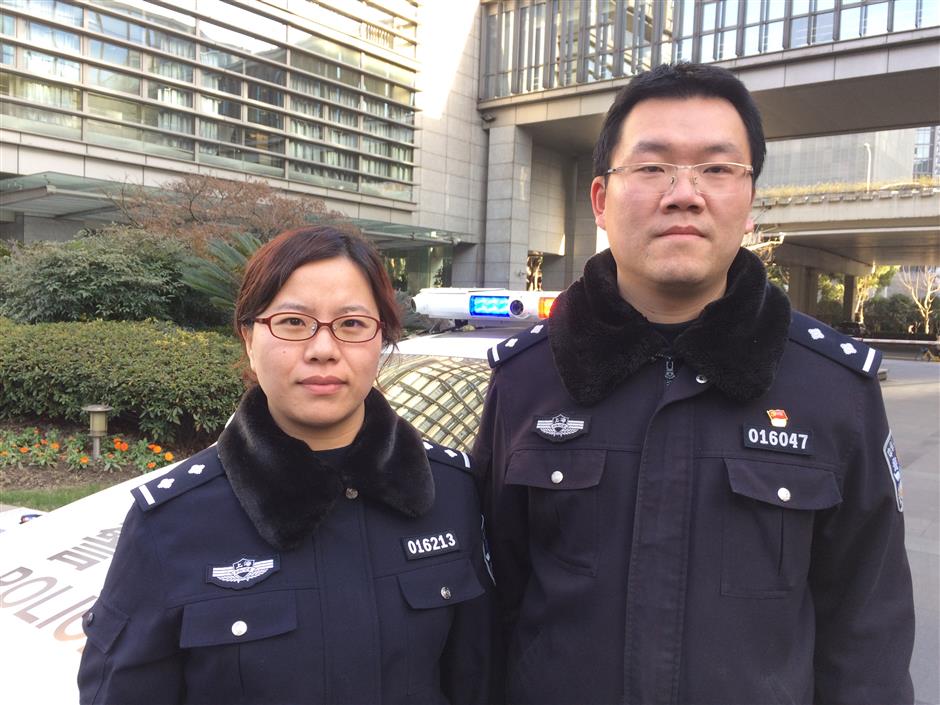Public security turns the tables on traditional family feasting
For people with critical jobs, there is no rest for the weary during the Spring Festival holiday. High on that list are police officers.
Lin Xinhui, 33, and Zhu Yanjun, 35, a married couple who both work as police officers, face another year having to forfeit the traditional Chinese Lunar New Year’s Eve dinner with their two children and other family members. They will both be working until after midnight strikes the entry of the Year of the Dog.

Lin Xinhui (right) and Zhu Yanjun of the Huangpu District Public Security Bureau will spend another Chinese New Year's Eve patrolling the streets.
“When I was a little girl, Chinese New Year’s Eve meant so much to me as an occasion for a family reunion, but now I have to put my work first,” said Zhu.
They met a decade ago while training at a police academy and got married in 2011.
Lin now works with the No. 4 Squad of the Huangpu Traffic Police, and Zhu works with the Huangpu Public Security Management Division. The couple has a six-year-old daughter and a 3-year-old son.
To maintain public safety, all police officers in Shanghai will be on duty for Chinese New Year’s Eve.
In the past few years, Zhu would be arriving at her office around 4pm on New Year’s Eve, where there would be a short meal with colleagues. Her assignment for the night was to patrol popular tourist spots, including Yuyuan Garden, to keep crowds under control and help visitors who lose their way.
After 10pm, Zhu would shift her patrol to a residential complex, where she would be on the lookout for illegal fireworks or other safety hazards.
“I have my New Year’s Eve’s dinner more often with my colleagues than with my family,” Zhu said, with a small smile.
Lin would start working at 9am on New Year’s Eve. Between 4-8pm, he would step in to cover for a few officers who were granted leave to go home to have dinner with their families.
After their own brief dinner at 8pm, he and fellow officers would be back on the streets again.
The city put on a ban on fireworks inside the Outer Ring Road last year as a precaution against explosive accidents and the heavy air pollution caused by fireworks’ smoke.
“When fireworks and firecrackers used to sound off, we knew that the New Year had arrived while we were on the beat,” Lin said. “I used to send my wife a quick message wishing her Happy New Year.”
The couple has often ended their shifts by going to a restaurant near their home in Pudong to have the first meal of the Chinese New Year. The couple lives with Lin’s parents, who take care of the children while the couple is working.
“I call my daughter when I get the chance during New Year’s Eve, and she always sounds unhappy and asks when I will get home,” said Zhu.
The couple tries to make up for their absence by arranging family reunion during the Spring Festival period. Zhu typically is assigned to work for four or five days during the seven-day holiday.
Unlike most other families in Shanghai who book up tables at restaurants months in advance of the Chinese New Year, Lin and Zhu never know their work rosters far enough in advance to make reservations. So when they have precious time off during the holiday, they cook at home. To improve their culinary skills, Lin and Zhu are taking cooking classes.
Huangpu police said they try to ensure that at least one member of a police couple will get some time off during the Chinese New Year holiday.
















